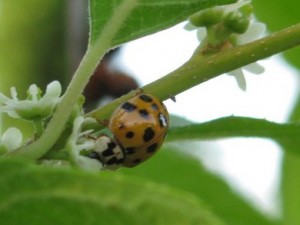
Beneficial lady-beetle pollinating winterberry holly
The goal of our pest management program may surprise you. Our goal is not to eradicate all pests from your property. A landscape totally free of all pest species is an ecologically unhealthy system that will be costly and difficult to maintain. An ecologically friendly and practical approach is to allow pest species to be present, but to keep their populations below a practical threshold. Pest species can be a food supply for beneficial organisms, and these landscape friendly insects, such as lady-beetles, green lacewings, and flower flies can provide a natural, pesticide-free control against future pest outbreaks.
Insect Pests
Occasionally, you may have trees and shrubs that harbor a large pest population causing substantial damage to your plant. This can occur when insect predators and parasites are rare or absent. Using a powerful pesticide could backfire under these conditions by eradicating the few beneficial insects which are nearby. Often the best action is to use a horticultural oil or soap that can reduce the pest population without damaging the plant. The residual effects will be short lived and will hopefully spare beneficial pest predators.
Tree Diseases
Many tree diseases, e.g., sycamore anthracnose, dogwood anthracnose, powdery mildew, and Dutch elm disease can be treated with fungicides. However, before using any chemical controls it is important to positively identify the pathogen. Our ISA Certified Arborists are familiar with the symptoms of common tree diseases and their host plants in the Hampton Roads area. To prevent tree diseases, it is best to take a proactive approach and use good cultural practices that will ensure your trees are vigorous and healthy and can defend themselves against disease causing pathogens. Many times your trees can become predisposed to an infectious disease because of poor cultural practices. Our management program focuses on using disease resistant species and improving cultural practices to keep your landscape green and healthy.
